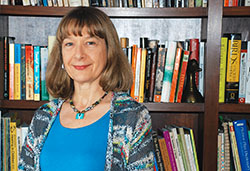 1. Lexington School for the Deaf in Queens is a so-called 4201 School. What exactly are Special Act 4201 Schools?
1. Lexington School for the Deaf in Queens is a so-called 4201 School. What exactly are Special Act 4201 Schools?
The State Legislature established Special Act 4201 Schools in 1947 — so named for section 4201 of Education Law — to serve the special education needs of children who are deaf, blind and/or severely physically or emotionally disabled. These state-supported, privately operated schools provide free education to all students who have been evaluated and recommended by a Committee on Special Education. There are 11 of them — eight schools for the deaf, one for the blind and two for students with emotional and/or physical handicaps.
2. Students in 4201 Schools face challenges most other students don't. What would you say is the greatest challenge your students face?
The greatest challenge for our students is developing a language. A large percentage of our students have hearing parents who speak a language other than English at home. Most of these parents are working hard to make ends meet and they struggle to find the time to learn English and sign language. Because of this, we have many students who cannot communicate with their parents and are only learning language during the 32 hours per week they attend school.
A small percentage of our students have deaf parents. These students have learned American Sign Language as their first language. The challenge for them is to learn to read and write English.
3. The 4201 Schools are funded through a complex rate-setting process, so they don't share in the same across-the-board percentage increase provided to traditional public school districts. How does that lack of parity affect services? Is staff retention a problem?
We are affected by the lack of appropriate funding in many ways. We have less money in our budget for textbooks and school supplies, as well as for keeping our computers and other technology up to date. We struggle to find money for key positions, such as our literacy coordinator.
Our teachers have master's degrees in deaf education and are dedicated to working with our students. Our teacher-to-student ratio is low because of our students' specialized needs, so we get to know our students extremely well. We are a tight-knit community. Unfortunately, our salaries are much lower than those at our local public schools, so some teachers have had to make the difficult choice to leave and teach elsewhere.
4. NYSUT is asking the state for a multi-million dollar fund dedicated to capital improvements and to address deferred maintenance issues at specialized schools. Tell us about your facilities.
Our school is very much in need of money for improvements and regular maintenance. The roof leaks in several places. The playgrounds desperately need repair. Our library is antiquated and needs to be updated to be more in line with current library models. Even basic maintenance such as replacing old carpeting and painting the classrooms and hallways has been put off for many years.
5. You recently attended NYSUT's Committee of 100 volunteer lobbying day in Albany. How has the union's advocacy helped advance education for your students?
This is the third year the Lexington School for the Deaf TA has sent representatives to Committee of 100. Many legislators do not know what the 4201 Schools are, or why we so desperately need more funding. We are beginning to change that as we meet with more legislators each year, and as NYSUT continues to lobby for us. I am hopeful that, as legislators begin to understand our needs, they will enact legislation to create funding parity between the 4201 Schools and their local school districts. With funding parity, the 4201 Schools would get the same percentage increases each year as local public schools. It would enable us to better meet the educational needs of our students.